NCAA to 'immediately consider updates' to rules surrounding athletes' image rights

The NCAA is positioning itself to make some changes to its current rules regarding amateurism.
The NCAA Board of Governors voted unanimously for the governing body to “immediately consider updates to relevant bylaws and policies for the 21st century” regarding athletes’ name and image rights. The move comes after state politicians are following California’s lead and moving to allow college athletes to receive endorsement and sponsorship money. Athletes are not allowed to retain their image rights under current NCAA rules.
The exact scope and scale of any potential updates is unclear. The NCAA was vague in its statement. There’s still a lot to be worked out and worked through. No changes were made on Tuesday. And here are the guidelines the NCAA says any changes to name and image rights rules should follow.
Assure student-athletes are treated similarly to non-athlete students unless a compelling reason exists to differentiate.
Maintain the priorities of education and the collegiate experience to provide opportunities for student-athlete success.
Ensure rules are transparent, focused and enforceable and facilitate fair and balanced competition.
Make clear the distinction between collegiate and professional opportunities.
Make clear that compensation for athletics performance or participation is impermissible.
Reaffirm that student-athletes are students first and not employees of the university.
Enhance principles of diversity, inclusion and gender equity.
Protect the recruiting environment and prohibit inducements to select, remain at, or transfer to a specific institution.
The NCAA and its member schools have long contended that athletes are not employees despite the time demands their sports require. Classifying athletes as employees would force schools to pay their athletes.
Any new rules, per the NCAA’s statement, should be implemented by January 2021.
“As a national governing body, the NCAA is uniquely positioned to modify its rules to ensure fairness and a level playing field for student-athletes,” NCAA President Mark Emmert said in a statement. “The board’s action today creates a path to enhance opportunities for student-athletes while ensuring they compete against students and not professionals.”
Fair Pay to Play Act signed into law in September
California Gov. Gavin Newsom signed the state’s Fair Pay to Play Act into law earlier this fall. The law doesn’t go into effect until 2023. Meanwhile, a similar bill is set to go through in Florida that would go into effect in 2020. Both laws allow college athletes in the states to receive endorsement and sponsorship income based on their status as college athletes.
NCAA rules have long prohibited athletes from getting endorsement income on the basis of its definition of amateurism. And those states went ahead and made laws against the NCAA’s current rules because the NCAA has dragged its feet for so many years when it comes to changing the rules limiting athletes’ rights.
The NCAA has spoken out against the Fair Pay to Play Act, even trying to call the bill unconstitutional. In an updated FAQ on its site, the NCAA said that it’s making the potential updates to its rules because it doesn’t want states to have different laws regarding college athlete amateurism.
It is critical that college sports are regulated at a national level. This ensures the uniformity of rules and a level playing field for student-athletes. The California law and other proposed measures ultimately would lead to pay for play and turn college athletes into employees. This directly contradicts the mission of college sports within higher education — that student-athletes are students first and choose to play a sport they love against other students while earning a degree.
It is fair to say, however, that states like California and Florida forced the NCAA’s hand. If California hadn’t passed the Fair Pay to Play Act, then the chances of the NCAA making its vague Tuesday statement in the same form are much slimmer.
But despite those lack of details, the NCAA’s statement is truly significant. A governing body that’s long been opposed to change is finally appearing open to making some large ones.
– – – – – – –
Nick Bromberg is a writer for Yahoo Sports.
More from Yahoo Sports:


